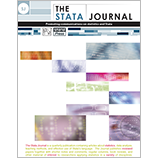Fitting heterogeneous choice models with oglm
Richard Williams
Department of Sociology
University of Notre Dame
Notre Dame, IN
[email protected]
|
Abstract. When a binary or ordinal regression model incorrectly assumes that error
variances are the same for all cases, the standard errors are wrong and (unlike
ordinary least squares regression) the parameter estimates are biased. Heterogeneous
choice models (also known as location–scale models or heteroskedastic
ordered models) explicitly specify the determinants of heteroskedasticity in an attempt
to correct for it. Such models are also useful when the variance itself is of
substantive interest. This article illustrates how the author’s Stata program oglm
(ordinal generalized linear models) can be used to fit heterogeneous choice and
related models. It shows that two other models that have appeared in the literature
(Allison’s model for group comparisons and Hauser and Andrew’s logistic
response model with proportionality constraints) are special cases of a heterogeneous
choice model and alternative parameterizations of it. The article further
argues that heterogeneous choice models may sometimes be an attractive alternative
to other ordinal regression models, such as the generalized ordered logit model
fit by gologit2. Finally, the article offers guidelines on how to interpret, test, and
modify heterogeneous choice models.
View all articles by this author:
Richard Williams
View all articles with these keywords:
oglm, heterogeneous choice model, location–scale model, gologit2, ordinal regression, heteroskedasticity, generalized ordered logit model
Download citation: BibTeX RIS
Download citation and abstract: BibTeX RIS
|
